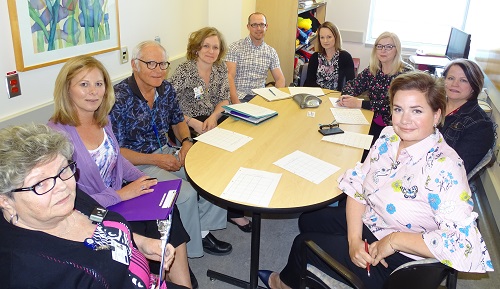
PEMBROKE – As part of their commitment to quality improvement, members of the Pembroke Regional Hospital’s health care team recently participated in a pilot project for palliative care that, because of its success, is now being rolled out to rural hospitals across the Champlain region.
“Over the years, Pembroke Regional Hospital has worked hard to ensure that compassionate, high quality end-of-life care and support is provided for our palliative patients,” said Sabine Mersmann, Vice-President of Patient Services – Seniors and Community Care.
To achieve this, the journey to date has included specialized training in palliative care for physicians and nurses on the Medical Unit.
PRH has been represented on the Champlain Hospice Palliative Care Program Advisory Council and on the Renfrew County Palliative and Hospice Care Network which brings together regional and local palliative and hospice care providers for regular discussions on how to improve access to high quality palliative care. The hospital has also partnered with the Champlain Regional Palliative Consultation Team (RPCT) for pain and symptom management.
The RPCT is a palliative care initiative funded by the Ministry of Health and Long-Term Care in partnership with Elisabeth Bruyere Continuing Care and the Champlain Local Health Integration Network’s (LHIN) Home and Community Care division.
Through RPCT, a team of registered and advanced practice nurses and nurse practitioners are assigned to work in the community and provide 24/7 on-call support for health care professionals throughout the Champlain region.
Pembroke Regional Hospital has a long-standing practice of hosting bi-weekly Palliative Care Rounds to discuss the palliative care needs of patients under their care. These Rounds bring together the hospital’s discharge planner, pastoral care and unit management, along with community-based palliative care providers and local physicians active in palliative care.
It was identified at these rounds just over a year ago that if the RPCT was able to offer consultations within hospital it may not only improve the comfort and quality of care for those patients but would also potentially improve the continuity of care from hospital to community – this became the basis for the pilot project.
“This pilot, along with the Palliative Care Rounds, has been key to helping to provide individualized, person-centred care, managing pain and other symptoms and supporting seamless transitions in care that are coordinated effectively among settings and providers,” said Dr. Jill Rice, who is a member of the RPCT.
During the past year, RPCT
Nurse Consultant Erin McCabe became actively involved in consultations at PRH and through this:
Provided education and mentoring; Participated in Palliative Care Rounds; Offered support in the areas of pain and symptom management and end of life care issues; Provided education and mentoring; Collaborated in planning formal education sessions and by providing access to palliative care resources and Facilitated transitions between community and hospital
“Partnering with the Pembroke Regional Hospital was a natural fit,” said Ms. McCabe. “I have supported health care professionals and their patients in the community for several years. The ability to now continue as part of their care team in the hospital allows for seamless quality palliative care to be delivered. A fundamental principle of palliative care is that it is a team approach. The partnership between PRH and RPCT puts that principle to practice.”
Local physicians say the partnership has had a real impact on palliative care delivery.
“Erin McCabe’s specialty in palliative care has been a tremendous resource to physicians and nursing staff in optimizing palliative care at PRH,” said hospitalist Dr. Mylene Gagne.
Dr. Scott Murray said he’s honoured to be part of the initiative.
“There has been a long tradition of caring for patients nearing the end of their life’s journey in the area that involves nurses, families, physicians, and many other health care workers,” he said. “Present and future support from the LHIN for palliative care is greatly appreciated.”
As part of the project’s expansion to rural hospitals within the Champlain region, additional nurse consultants will be hired.






![Kenopic/Smith Auction [Paid Ad]](https://whitewaternews.ca/wp-content/uploads/2018/10/advertising-100x75.jpeg)

